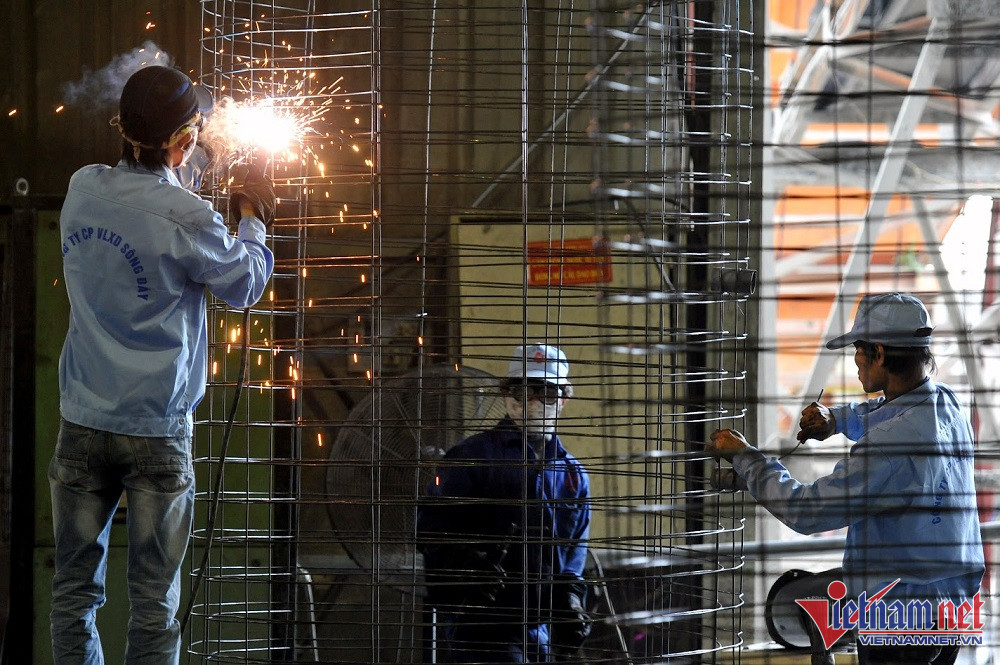
In 2022, FC Vietnam, a Japanese owned enterprise, built more warehouses (3-storey and office). The design of fire prevention and control items was approved, and all required items were built and installed.
However, the items had not been officially accepted because of procedures. The fireproof paint for steel truss in the warehouse area on the third floor must be conducted by state agencies.
As the inspection of the items could not be done, the inspection of the remaining areas and newly built office of the company could not be officially accepted.
The company hopes that the other items will be checked and accepted first, so that the company can put the items into use immediately.
Later, when state agencies issue regulations related to the inspection of fireproof paint, the company will provide additional documents as required for official acceptance of the third-floor area.
Meanwhile, Hyosung Vietnam, a South Korean invested company, complained that the procedures for applying for fire prevention and control inspection are complicated.
Previously, the inspection was conducted by localities. However, in late 2022, the work was transferred to C07 of the Ministry of Public Security (MPS). As the time for inspection has not been defined, this has caused difficulties for enterprises that want to expand projects.
Samtec Vietnam in Long Thanh district said the company is renovating a warehouse and mezzanine floor and is waiting for agencies to re-inspect the design of fire prevention and control items.
The company has been working with fire prevention and control agency since October 2022, but the application of regulations remains unclear. This has heavily impacted the investment pace of its holding company in Vietnam.
The Council of Taiwanese Chambers of Commerce in Dong Nai told the press that its member companies submitted the design documents on fire prevention and control to the provincial fire prevention and control agency seven months ago, but the documents have not been approved.
The problem is that the agency has not pointed out why the enterprises’ designs and preparations could not be accepted.
Meanwhile, a representative of a company in a northern industrial zones (IZ) said his company wants to improve a workshop as a part of the plan to scale up production, but the company cannot obtain inspections for the improvements.
One of the reasons is the special regulation on a smoke tank system (dividing, isolating smoke into smoke zones).
“If our enterprise satisfies the requirements on a smoke tank, it won’t be able to equip other systems, such as air conditioning, or cooling water for a chiller system,” he said.
Under current regulations, load-bearing structure must be fire resistant for a certain time, and the fireproof material must be inspected. Therefore, enterprises have to spend a lot to paint workshop structures with fireproof paint.
An enterprise reportedly spent VND1 billion just to experiment with burning a sample for inspection. It now has to spend VND24 billion on fireproof paint for its 24,000 sqm workshop.
Meanwhile, under standards QCVN 06:2022/BXD, workshops must be painted once every five years, which costs enterprises a lot of money.
In a document to the Dong Nai People’s Committee last March, the IZ Management Board of the province affirmed that the biggest obstacle in fire prevention and control is the inspection of fireproof paint.
Many construction works have completed the execution, but fire prevention and control units belonging to Dong Nai Police still cannot officially accept them. As a result, the works cannot be put into use it begin production, or be used as collateral for bank loans.
Lieutenant Colonel Nguyen Van Hai from PC 07 of Dong Nai Police said periodic inspections, two times a year, is organized. The unit recently worked with C07 discussing solutions to remove difficulties for enterprises.
Prior to that, in November 2022, The Japan Chamber of Commerce and Industry (JCCI) lodged a complaint with the Minister of Public Security (MPS), asking to quickly grant certificates on inspecting fire prevention and fighting equipment for manufacturers and warehouses.
JCCI said its member enterprises that have newly built or expanded factories and warehouses in Vietnam could not put factories into operation because they could not obtain this kind of certificate.
A survey of the organization found that by the end of 2022, at least 18 Japanese projects with total value of VND3.097 trillion had been affected by this problem.
Construction companies could not hand over construction works to investors, and factories could not become operational.
Currently, many investors in the north want to run solar power projects on the roofs of workshops in IZs.
This allows enterprises to save money on electricity and obtain green certificates to export products to markets offering a preferential CO2 emission tax.
However, they have to cope with many regulations on fire prevention and control.
Many are described as ‘impossible’ under the Ministry of Construction’s (MOC) QCVN 06:2022/BXD regulations.
“The regulations are very strict, while the instructions to implement the regulations are unclear,” an investor said.
Tran Chung